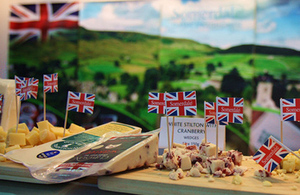New call for food labels to meet growing consumer demand for local produce
4 in 5 people think we should support our local food producers

The Government is calling on food producers and shops to give more information on labels about where in Britain their food comes from, as new research shows that almost 80 per cent of people see buying local food as a top priority.
The new research highlights that vegetables (51%) and meat (40%) topped the list of products that people would buy if a local option was available, demonstrating the potential to grow our meat and vegetable industry, worth £10.5 billion in 2014.
Speaking as British Food Fortnight launches this weekend, Environment Secretary Elizabeth Truss said local labelling, like showing what farm or county the food is from, would help consumers take pride in buying British produce and support our growing rural economy.
Food retailers and producers are already embracing the growing demand for local food, with supermarket Tesco developing a unique tool that allows online shoppers to search for products sourced within 10 miles of their local area. In addition, country of origin labelling on meat produce is now widely in use.
Environment Secretary Elizabeth Truss said:
Food and drink is at the heart of British life—from top-quality seafood from the Yorkshire coast, to traditional cheeses from Cornwall and delicious gin distilled in the heart of London.
Our one nation government is doing more than ever to support British farmers and producers by creating the right environment for these small businesses to flourish. This means supporting better country of origin labelling to ensure shoppers can get behind our British farmers and building better broadband and transport links so it’s as easy to open and expand a business in Cornwall as it is in Camden.
Today’s figures highlight the enthusiasm of British consumers for our astonishing variety of local produce which helps grow our £100bn food and farming industry even further. I would encourage everyone to use British Food Fortnight to celebrate the diversity, quality and tradition of food and drink across the country.
Earlier this month the government called for more consistent and clearer labelling for dairy products at EU level, and the UK continues to lobby to ensure rules on country of origin labelling can use terms such as ‘Made in Scotland’, ‘Made in Wales’ or ‘Made in Yorkshire’.
The government has already pushed for country of origin labelling for fresh, unprocessed goat, pork, lamb and poultry which has been required by law since April this year. Research from 2013 showed that around 90% of retailers went further to provide clearer country of origin labelling for lightly processed products such as bacon, sausages and burgers and some dairy products including milk.
Later this year the government will also launch Great British Food, an initiative that will take the lead in celebrating top-quality British produce both at home and abroad, working with retailers to embrace the demand for British food, and increasing the number of protected food names to promote British specialities across the world.
Together these measures support the government’s wider Rural Productivity Plan, launched in August of this year. Designed to unleash the full potential of our countryside by providing jobs and improving the quality of life for the people in rural communities this plan will help our farmers and food entrepreneurs to promote their produce both at home and abroad.
Notes to Editors
- Source: YouGov Omnibus 2015 report ‘Locally Sourced Produce’ conducted on behalf of East of England Co-op.
- On April 1st 2015, compulsory country of origin labelling (CoOL) for fresh and frozen pork, poultry meat and lamb was agreed at European level as part of the EU Food Information to Consumers Regulation in 2011.
- It requires all of the above meat to be labelled with the country of rearing and slaughter. The term ‘origin’ is exclusively reserved for meat that has been obtained from animals born, reared and slaughtered all in the same country.
- The ‘Voluntary Principles’ require that the country of origin given on meat labels represents where the animal from which the meat was obtained had been born and reared and also covers lightly processed products such as bacon, sausages and burgers and non-meat products such as milk.
- For more information please contact Defra’s press office on 020 7238 5498 or out of hours on 0345 051 8486.